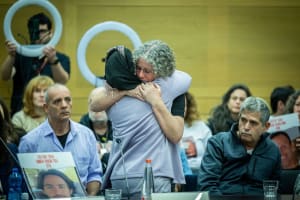‘The first missile in the Gaza war was fired at the Abraham Accords,’ but they are thriving anyway, Israel’s chief diplomat to the UAE tells ALL ISRAEL NEWS
Eitan Na’eh says Iranian and Hamas leaders want to blow up normalization, but Na’eh praises UAE leaders for the vision and courage to stay the course
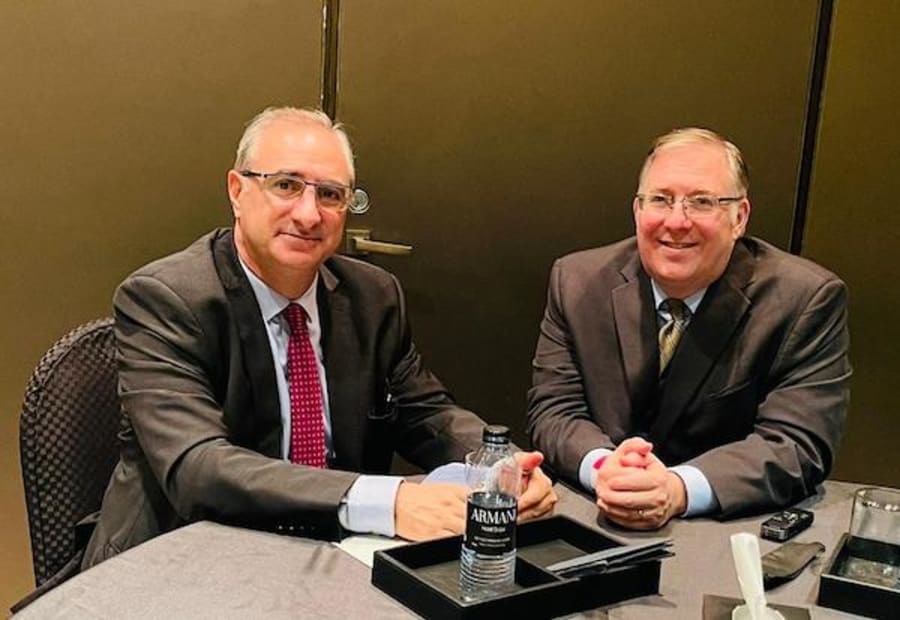
DUBAI, UNITED ARAB EMIRATES—The leaders of Iran and Hamas are determined to blow up the Abraham Accords and all efforts at normalizing relations between Israel and the Arab world.
The good news is that because of the vision and courage of UAE Crown Prince Mohammed bin Zayed al Nahyan and other senior UAE officials, the Accords have not only survived, but are thriving.
That is the assessment of Eitan Na’eh, Israel’s first emissary to the United Arab Emirates.
Already:
More than 85,000 Israelis have visited the UAE since the Accords were signed
Israel and the UAE have signed 25 agreements in 15 fields of commerce
Bilateral trade between Israel and UAE has surged to more than $300 million
And Na’eh says there is much more to come.
I sat down with Israel’s chief diplomat in the Gulf region at the Global Investment Forum organized by The Jerusalem Post and the Khaleej Times.
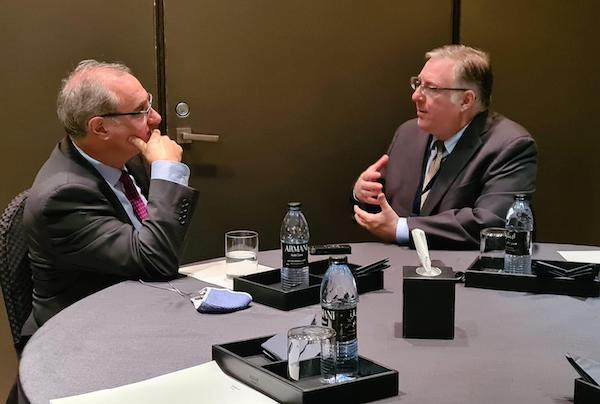
More than 300 major business and investment leaders, thought leaders, journalists and government officials from the UAE, Bahrain, Morocco, the U.S. and Israel gathered at the Burj Khalifa, the tallest building in the world.
The focus: how to build upon peace and normalization to create joint ventures, dramatically increased trade, tourism and good paying jobs for citizens and companies in all countries cooperating in the Accords.
Na’eh was one of the keynote speakers and it quickly became clear that he is both passionate and laser-focused on making sure last September’s peace signing at the White House is only the first step in a much larger and more exciting regional project.
Technically, Na’eh – who previously served as Israel’s ambassador to Turkey from 2016 to 2018 – is not yet a full ambassador to the UAE, he told me.
Rather, he received a temporary appointment in January to serve as Israel’s Charge d’Affaires.
When Israel has a fully functioning government again, the new prime minister and foreign minister will appoint a full ambassador.
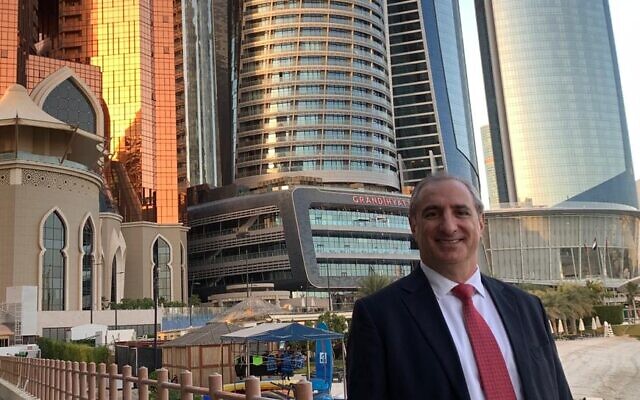
IRAN AND HAMAS ARE TARGETING THE ABRAHAM ACCORDS
It is important for the world to understand, Na’eh told me, that Iran, Hamas, and other radical Islamist states and organizations are gunning for the Abraham Accords.
The Islamists are desperate to destroy these new and dramatic moves towards normalization, lest they appear to succeed, other Arab and Muslim countries join in, and momentum begins to accelerate.
Indeed, Na’eh points out that Hamas and Iranian leaders have explicitly gone on the record to say that they are targeting the Accords.
“This battle [recent rocket war] has destroyed the project of ‘coexistence’ with the Israeli occupation, of the project ‘normalization’ with Israel,” Hamas chief Ismail Haniyeh said in May from Doha, the capital of Qatar, where he lives far from the fighting.
“This is a divine victory” over Israel,” Haniyeh boasted. “This harsh blow will leave a deep impact on [Israel]. Praise to you, God, for this blessed, awesome victory.”
Iran’s Supreme Leader – the Grand Ayatollah Ali Khamenei – also said in May that the Gaza war was part of larger strategy to destroy normalization.
“The hope for victory [over Israel] is today greater than ever,” Khamenei said. “The balance of power has shifted dramatically in the Palestinians' favor, the Zionist enemy grows weaker every year. The [IDF] military that called itself 'the invincible army' has today become an army that will never taste victory.”
“The political situation of this [Israeli] entity – which has been forced to hold elections four times in two years, whose security situation repeatedly fails, and from whom the Jews increasingly seek to emigrate – attests to the fact that [in it] one scandal is followed by another,” Khamenei added. “The ongoing efforts at normalization with some Arab countries, which are assisted by America, are a sign of the weakness of this entity, and will of course not help it.”
“It [Israel] formed ties with Egypt decades ago, but from then to now the Zionist enemy has become much weaker and more vulnerable,” Khamenei insisted. “Can relations with a few weak and disgraced countries help it? These countries will obviously not benefit from these relations. The Zionist enemy will sow destruction in their lands, their property, and their security.”
“These facts must not cause others to ignore their heavy responsibility to this movement [towards normalization],” he said. “Muslim and Christian clerics must issue a religious prohibition on normalization, and the intellectuals and free [thinkers] must explain to all the ramifications of this treachery, that is like a dagger in Palestine's back.”
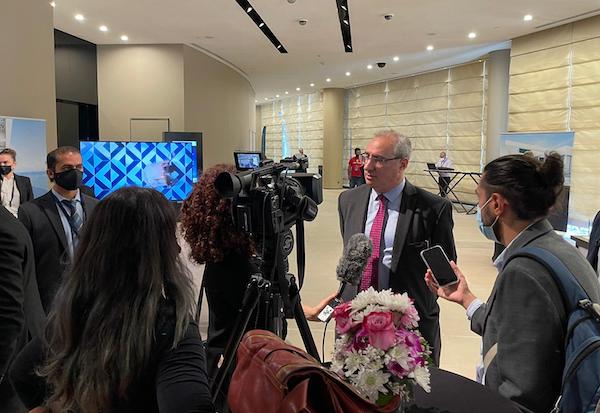
ISRAELI DIPLOMAT SAYS THE GAZA WAR FAILED TO DESTROY NORMALIZATION EFFORTS
Na’eh, however, told me that for all of the efforts by Iran and Hamas to destroy normalization, the recent war actually proved that the Accords have survived.
What’s more, he expects them to thrive.
Here is a partial transcript of our conversation:
ROSENBERG: As you arrived in the country, what was the public mood here among the Emiratis towards the Abraham Accords?
NA’EH: I'd describe it as happiness. There was a lot of excitement. A lot of curiosity. People said things like, “It’s about time.” I remember I came into a restaurant and people were happy to know that the Israeli ambassador to the UAE was in the restaurant. They sent cakes to my table. And I would say there was also an element of novelty of the whole thing.
ROSENBERG: That’s great. Would you also say that for those who think the Abraham Accords is a positive development, that there has been a sense of pride among Emiratis? You know, a sense that, “Our country is going to the moon. We’ve got the world expo coming up. We're making all these scientific and cultural advances. We’ve had Pope Francis come visit. And we’re also moving forward towards peace.” Is that a fair representation of those who think it's positive?
NA’EH: Yes, absolutely, I think pride is a word I would also use. Emiratis like being the first, that they are at the head of the peace camp, showing the way. So, I would use a few different words to describe how Emiratis have been feeling – hope, pride, happiness, excitement, curiosity.
ROSENBERG: What, then, has it been like during the first Arab-Israeli shooting war since the Abraham Accords were signed? Because in some ways, the Abraham Accords themselves were under fire. The leaders of Hamas, Islamic Jihad, and Iran have all been saying that they are trying to blow up the Accords.
NA’EH: It depends on how individual Emiratis went into the process in the first place. I think that most people look positively on the Accords, and they understand that this is a promise, that this is a process. This is not the end of the road. This is the beginning of a road. So, such people looked at it [the situation in Gaza] and said, “This is a war. Missiles are flying. People getting killed.” But they also, you know, took a step back to look at how the war developed. We [in the Israeli embassy] didn’t know how it was going to be, how people were going to react. But in the end, it seems to have turned out alright. People seem to think that we all need to get back to business, back to the mission of building peace and cooperation, and to try and make sure that it [a war with the terrorists in Gaza] won't happen again.
ROSENBERG: It was an interesting test of the Abraham Accords, sadly.
NA’EH: Yes, but look, we are tested all the time in the Middle East, every time we have peace, every time that we are getting close to peace.
I would say that the first missile that was fired from Gaza was not aimed at Jerusalem or Tel Aviv. It was aimed at the Abraham Accords. And Ismail Haniyeh himself said that Hamas tried to go for the Abraham Accords to make them fail and he said that Hamas had succeeded in that. But he could not be more wrong. I think the war strengthened the Accords. We are all back to business. We just signed an agreement with the UAE to prevent double taxation. We are signing other agreements. We have high-level contacts. Our foreign ministers kept in touch throughout the whole, briefing each other. I was in the UAE Foreign Ministry briefing my Emirati colleagues on what was happening. So, clearly, Hamas tried to sabotage the peace process and failed.
ROSENBERG: Is it fair to say that the crown prince and the other Emirati leadership had already calculated this tension with Hamas and Islamic Jihad into their decision-making calculus, and they have already made their choice that they want peace with Israel and the terrorists are not going to stop them? And is it also true that the Emirati government wants to be clear that they support the Palestinian people, but they are taking a stand against radicalism, and that they want to make peace even if they don’t agree with Israel on everything? Is that a reasonable understanding of what they are thinking?
NA’EH: My first remark is, yes, you are right. It’s my feeling that they made a very calculated decision, a strategic one. They want to have normalized relations with Israel, but that doesn’t mean that from now on we agree on anything that each other does. But we have a way of discussing it, and we can discuss it directly.
ROSENBERG: That is huge.
NA’EH: It is. And that is exactly what I mean when I say that the foreign minister of Israel can call his Emirati counterpart during a military campaign and brief each other and discuss whatever needs to be discussed. That is important.
It’s also important that if anybody was trying to sabotage the peace process, they failed.
And yes, the Emirates are rightfully for the Palestinian people.
We are, too, in Israel.
I think the problem is that the Palestinian leadership is not for the Palestinian people. They just seem to sit there and let the Palestinian population suffer. Hamas seems to enjoy seeing Palestinians suffer.
That’s so different than the UAE. Here, I see the Emirati leadership that has made a calculated decision to make the lives of its citizens better. They have made the decision to make the lives of their people better. They have put their people as their top priority.
ROSENBERG: And I think the Emiratis see Israelis as “kindred spirits,” we might say in English, right? They see that Israel has had so many challenges, but we want to make life better for both Jews and Arabs. People accuse us of being an “apartheid state.” But really, how many Jews live in Egypt? How many Jews live in Jordan, or the Palestinian Authority? Zero. Yet 20% of Israel are Arabs, and they are full and worthy citizens in Israel.
NA’EH: Yes, and see how Jews are treated here in the UAE? I have had really the opportunity to see what it means to live in an Arab country as a Jew, the tolerance and acceptance they have is amazing. They are “agnostic,” in the way, to your origin and your nationality and your religion. They don’t treat you badly because you’re a Jew or a Christian or a Buddhist.
ROSENBERG: Given that this country is literally across the water from the Islamic Republic of Iran, that's even a more interesting development.
NA’EH: Well, that’s true. True peace so uncommon in the Middle East, right? But here we have people who are “agnostic” when it comes to your religion, your politics, your culture. “You're Jewish?” they say. “That’s interesting. You know, we are curious, but you're free to hold whatever religious belief you want, as long as you don't hurt anybody else's religion.” And that gives one hope that, you know, maybe one day other countries will copy the Emirati approach, their way of thinking, because it’s the kind of thinking that does bring peace. And again, this doesn't mean that you agree with everybody in the region. No. I don't think I see eye to eye with my wife or kids all the time, yet I love them to bits. So, you know, the Emirati approach, yes, it’s encouraging.
ROSENBERG: This Global Investment Forum that we are at is just a small symbol, but one of the things I am fascinated about this conference is that is not focused on geopolitics. It is not focused on the process of peace-making. Instead, the focus here is on prosperity, on how we can build on this peace by actually investing in each other. And that's one of the reasons I wanted to come, even with the Super Bowl of politics going on back home in Israel. I'm not aware of any event quite like this where you have actual major businesses and investors coming together talking about how to build on the Abraham Accords through trade and business and investment.
NA’EH: Peace itself is a means to an end. It's not the end. It's a means to an end. Israel and the UAE have established normalization. We have signed a treaty. We have opened embassies. People can visit both countries. But that’s just the beginning. Now we are developing the fruits of that.
People sometimes get confused. “Let's have peace,” they say. Okay, for what? Let's have peace for what? You need peace in order to live in security. That’s the first priority of every human. And you need security in order to prosper. That’s the end result.
So, we've signed a peace agreement. And we are working to reach true security. And now we come together to talk about how we can prosper together.
ROSENBERG: And yet this summit would have been an easy event to cancel because of the recent war, if the Emiratis had wanted to.
NA’EH: It's a chain reaction of events. If you don't have normalcy, you can't have all the rest. But we should not forget that one thing leads to another. Some people think that you have ended your mission to create peace once you sign the paper. But that’s not true. It’s not easy to negotiate a process of acceptance. It's a mental process of finding acceptance with one another. Reaching an agreement is negotiation. It’s learning how to make compromises. But once you achieved it, once you signed, it’s not one. Now you have to build a building. You bought the land. You got the permits. Now you have to start building the first floor, the second floor, and so on.
We signed the agreement in Washington in September. By December, Israelis came rushing in to visit the UAE – roughly 85,000 Israelis in a short period of time. Maybe more. Look, I lost count how many Israelis came here. But I can tell you Israelis were excited. It’s very exciting to leave the country and travel only three hours and land in the middle of an Arab country and be accepted as human beings. And the Israelis who have come, they're happy because you can now do it, visit an Arab country and be safe and have a good time.
ROSENBERG: Ambassador, thank you for your time and insights.

Joel C. Rosenberg is the editor-in-chief of ALL ISRAEL NEWS and ALL ARAB NEWS and the President and CEO of Near East Media. A New York Times best-selling author, Middle East analyst, and Evangelical leader, he lives in Jerusalem with his wife and sons.






